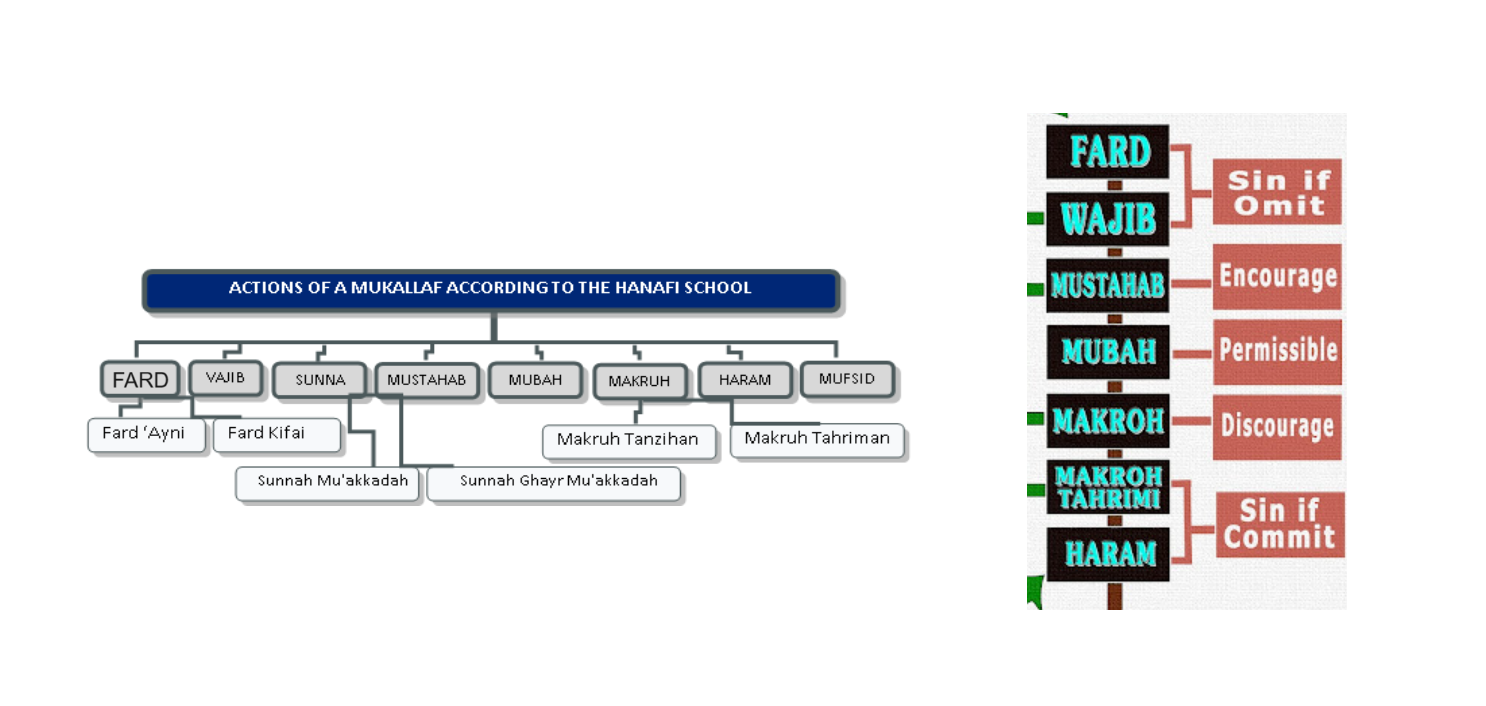|
Halal
''Halal'' (; ) is an Arabic word that translates to in English. Although the term ''halal'' is often associated with Islamic dietary laws, particularly meat that is slaughtered according to Islamic guidelines, it also governs ethical practices in business, finance (such as the prohibition of interest or ''riba''), and daily living. It encompasses broader ethical considerations, including fairness, social justice, and the treatment of animals. The concept of ''halal'' is central to Islamic practices and is derived from the Quran and the Sunnah (the teachings and practices of the Prophet Muhammad). In the Quran, the term ''halal'' is contrasted with the term ''haram'' (). The guidelines for what is considered ''halal'' or ''haram'' are laid out in Islamic jurisprudence (''fiqh''), and scholars interpret these guidelines to ensure compliance with Islamic principles. This binary opposition was elaborated into a more complex classification known as "Ahkam, the five decisions": Fard, ... [...More Info...] [...Related Items...] OR: [Wikipedia] [Google] [Baidu] |
Islamic Dietary Laws
Islamic dietary laws are laws that Muslims follow in their diet. Islamic jurisprudence specifies which foods are halal () and which are haram (). The dietary laws are found in the Quran, the holy book of Islam, as well as in hadith, collections of traditions attributed to the Islamic prophet Muhammad. Herbivores, cud-chewing animals like cattle, deer, sheep, goats, and antelope are some examples of animals that are halal only if they are treated like sentient beings and slaughtered painlessly while reciting the ''basmala'' and ''takbir''. If the animal is treated poorly or tortured while being slaughtered, the meat is haram. Forbidden food substances include alcohol, pork, frog, carrion, the meat of carnivores, and animals that died due to illness, injury, stunning, poisoning, or slaughtering not in the name of God. Regulations of food Halal (permissible, lawful) Quranic verses that have information regarding halal foods include: Q2:173, Q5:5, and Q6:118–119, 121. Permissibl ... [...More Info...] [...Related Items...] OR: [Wikipedia] [Google] [Baidu] |
Haram
''Haram'' (; ) is an Arabic term meaning 'taboo'. This may refer to either something sacred to which access is not allowed to the people who are not in a state of purity or who are not initiated into the sacred knowledge; or, in direct contrast, to an evil and thus " sinful action that is forbidden to be done". The term also denotes something "set aside", thus being the Arabic equivalent of the Hebrew concept () and the concept of (cf. sacred) in Roman law and religion. In Islamic jurisprudence, ''haram'' is used to refer to any act that is forbidden by Allah and is one of the five Islamic commandments ( ) that define the morality of human action. Acts that are haram are typically prohibited in the religious texts of the Quran and the category of haram is the highest status of prohibition. Something that is considered haram remains prohibited no matter how good the intention is or how honorable the purpose is. Sins, good, and meritorious acts are placed on the (weighin ... [...More Info...] [...Related Items...] OR: [Wikipedia] [Google] [Baidu] |
Makruh
In Islamic terminology, something which is makruh or makrooh (, transliteration, transliterated: ''makrooh'' or ''makrūh'') is "disliked", literally "detestable" or "abominable". This is one of the Ahkam, five categories (''al-ahkam al-khamsa'') in Islamic law – ''wajib/fard'' (obligatory), ''Mustahabb/mandub'' (recommended), ''mubah'' (neutral), ''makruh'' (disapproved), ''haram'' (forbidden). Though a ''makruh'' act is not ''haraam, haram'' (forbidden) or subject to punishment, a person who abstains from this act will be rewarded. Muslims are encouraged to avoid such actions when or as possible. It is one of the degrees of approval (''ahkam'') in sharia, Islamic law. In the terminology of Islamic jurisprudence, "Makruh" refers to an action that is not forbidden to do, but had better to be abandoned. Acts considered ''makruh'' can vary between different Madhhab, madhhabs due to differing scholarly interpretations of the Quran and Hadith, with Hanafi scholars in particular dif ... [...More Info...] [...Related Items...] OR: [Wikipedia] [Google] [Baidu] |
Shariah
Sharia, Sharī'ah, Shari'a, or Shariah () is a body of religious law that forms a part of the Islamic tradition based on scriptures of Islam, particularly the Qur'an and hadith. In Islamic terminology ''sharīʿah'' refers to immutable, intangible divine law; contrary to ''fiqh'', which refers to its interpretations by Islamic scholars. Sharia, or fiqh as traditionally known, has always been used alongside customary law from the very beginning in Islamic history; has been elaborated and developed over the centuries by legal opinions issued by qualified jurists – reflecting the tendencies of different schools – and integrated and with various economic, penal and administrative laws issued by Muslim rulers; and implemented for centuries by judges in the courts until recent times, when secularism was widely adopted in Islamic societies. Traditional theory of Islamic jurisprudence recognizes four sources for Ahkam al-sharia: the Qur'an, ''sunnah'' (or authentic ahadith) ... [...More Info...] [...Related Items...] OR: [Wikipedia] [Google] [Baidu] |
Mubah
''Mubāḥ'' (Arabic: مباح) is an Arabic word roughly meaning "permitted", which has technical uses in Islamic law. "Mubah" is an Islamic jurisprudential term that refers to an action for which a person has no specific obligation. Consequently, performing or abstaining from it is considered equally permissible, and neither action results in reward or punishment from the perspective of God in Islam. In uṣūl al-fiqh (), ''mubāḥ'' is one of the five degrees of approval (ahkam): # () - compulsory, obligatory # () - recommended # () - neutral, not involving God's judgment # () - disliked, reprehensible # () - forbidden Mubah is commonly translated as "neutral" or "permitted" in English., "indifferent" or "(merely) permitted". It refers to an action that is not mandatory, recommended, reprehensible or forbidden, and thus involves no judgement from God. Assigning acts to this legal category reflects a deliberate choice rather than an oversight on the part of jurists ... [...More Info...] [...Related Items...] OR: [Wikipedia] [Google] [Baidu] |
Vegetarian Cuisine
Vegetarian cuisine is based on food that meets vegetarian standards by not including meat and animal tissue products (such as gelatin or animal-derived rennet). Common vegetarian foods Vegetarian cuisine includes consumption of foods containing vegetable protein, vitamin B12, and other nutrients. Food regarded as suitable for all vegetarians (including vegans) typically includes: * Cereals/grains: barley, buckwheat, corn, fonio, hempseed, maize, millet, oats, quinoa, rice, rye, sorghum, triticale, wheat; derived products such as flour (dough, bread, baked goods, cornflakes, dumplings, granola, Muesli, pasta etc.). * Vegetables (fresh, canned, frozen, pureed, dried or pickled); derived products such as vegetable sauces like chili sauce and vegetable oils. * Edible fungi (fresh, canned, dried or pickled). Edible fungi include some mushrooms and cultured microfungi which can be involved in fermentation of food (yeasts and moulds) such as ''Aspergillus oryzae'' and ''Fusarium ... [...More Info...] [...Related Items...] OR: [Wikipedia] [Google] [Baidu] |
Alcoholic Drink
Drinks containing alcohol (drug), alcohol are typically divided into three classes—beers, wines, and Distilled beverage, spirits—with alcohol content typically between 3% and 50%. Drinks with less than 0.5% are sometimes considered Non-alcoholic drink, non-alcoholic. Many societies have a distinct drinking culture, where alcoholic drinks are integrated into party, parties. Most countries have Alcohol law, laws regulating the production, sale, and consumption of alcoholic beverages. Some regulations require the labeling of the percentage alcohol content (as ABV or Alcohol proof, proof) and the use of a Alcohol warning label, warning label. List of countries with alcohol prohibition, Some countries Prohibition, ban the consumption of alcoholic drinks, but they are legal in most parts of the world. The temperance movement advocates against the consumption of alcoholic beverages. The global alcohol industry, alcoholic drink industry exceeded $1.5 trillion in 2017. Alcohol is o ... [...More Info...] [...Related Items...] OR: [Wikipedia] [Google] [Baidu] |
Cosmetics
Cosmetics are substances that are intended for application to the body for cleansing, beautifying, promoting attractiveness, or altering appearance. They are mixtures of chemical compounds derived from either Natural product, natural sources or created synthetically. Cosmetics have various purposes, including personal care, personal and skin care. They can also be used to conceal blemishes and enhance natural features (such as the eyebrows and eyelashes). Makeup can also add colour to a person's face, enhance a person's features or change the appearance of the face entirely to resemble a different person, creature, or object. People have used cosmetics for thousands of years for skin care and appearance enhancement. Visible cosmetics for both women and men have gone in and out of fashion over the centuries. Some early forms of cosmetics contained harmful ingredients such as lead that caused serious health problems and sometimes resulted in death. Modern commercial cosmetic ... [...More Info...] [...Related Items...] OR: [Wikipedia] [Google] [Baidu] |
Pharmaceuticals
Medication (also called medicament, medicine, pharmaceutical drug, medicinal product, medicinal drug or simply drug) is a drug used to diagnose, cure, treat, or prevent disease. Drug therapy ( pharmacotherapy) is an important part of the medical field and relies on the science of pharmacology for continual advancement and on pharmacy for appropriate management. Drugs are classified in many ways. One of the key divisions is by level of control, which distinguishes prescription drugs (those that a pharmacist dispenses only on the medical prescription) from over-the-counter drugs (those that consumers can order for themselves). Medicines may be classified by mode of action, route of administration, biological system affected, or therapeutic effects. The World Health Organization keeps a list of essential medicines. Drug discovery and drug development are complex and expensive endeavors undertaken by pharmaceutical companies, academic scientists, and governments. As a ... [...More Info...] [...Related Items...] OR: [Wikipedia] [Google] [Baidu] |
Hadith
Hadith is the Arabic word for a 'report' or an 'account f an event and refers to the Islamic oral tradition of anecdotes containing the purported words, actions, and the silent approvals of the Islamic prophet Muhammad or his immediate circle ( companions in Sunni Islam, Ahl al-Bayt in Shiite Islam). Each hadith is associated with a chain of narrators ()—a lineage of people who reportedly heard and repeated the hadith from which the source of the hadith can be traced. The authentication of hadith became a significant discipline, focusing on the ''isnad'' (chain of narrators) and '' matn'' (main text of the report). This process aimed to address contradictions and questionable statements within certain narrations. Beginning one or two centuries after Muhammad's death, Islamic scholars, known as muhaddiths, compiled hadith into distinct collections that survive in the historical works of writers from the second and third centuries of the Muslim era ( 700−1000 CE). For ... [...More Info...] [...Related Items...] OR: [Wikipedia] [Google] [Baidu] |







